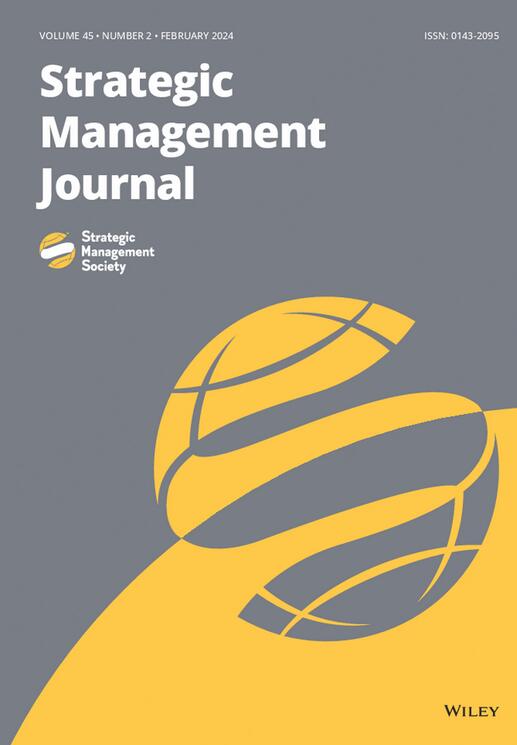Strategic restraint: When do human‐capital‐intensive companies choose (not) to use noncompete agreements?
IF 7.2
1区 管理学
Q1 BUSINESS
引用次数: 0
Abstract
Research SummaryExtant work in strategic management has focused on the role of noncompete agreements (NCAs)—a form of restrictive legal lever used by firms when managing human capital—and conceptualized them as being advantageous to firms. Challenging this notion, we highlight a novel downside of using NCAs and show how their use by some firms creates differentiation opportunities for rival firms. We analyze a unique survey dataset to examine the heterogeneity in the firms' actual use of NCAs conditional on industry and state. We find that the nonuse of NCAs is more common among firms that rely more heavily on talent and are also not the industry leaders, and such firms are more likely not to use NCAs with the goal of attracting skilled employees.Managerial SummaryNoncompete agreements (NCAs) have long been regarded as effective tools for firms managing human capital. Our research challenges this conventional wisdom. We show that NCAs are not uniformly beneficial to all firms even when looking at competitors within the same industry. By analyzing a unique survey dataset, we find that firms relying heavily on talent and not leading their industries are more inclined to forgo NCAs. Their strategic intent? Attracting skilled employees. This study sheds light on the delicate balance between legal constraints and talent attraction and is particularly salient in the context of the policy efforts to ban NCAs.战略约束:人力资本密集型企业何时选择(不选择)使用非竞争协议?
研究摘要战略管理领域的大量研究集中于非竞争协议(NCAs)--一种企业在管理人力资本时使用的限制性法律杠杆--的作用,并将其概念化为对企业有利。我们对这一概念提出质疑,强调了使用非竞争协议的新弊端,并展示了一些企业使用非竞争协议是如何为竞争对手创造差异化机会的。我们分析了一个独特的调查数据集,研究了企业在行业和国家条件下实际使用非竞争性资本的异质性。我们发现,不使用竞业禁止协议的情况在那些更依赖人才且并非行业领导者的企业中更为普遍,而且这类企业更有可能不使用竞业禁止协议来吸引技术熟练的员工。管理总结长期以来,竞业禁止协议一直被视为企业管理人力资本的有效工具。我们的研究对这一传统观点提出了挑战。我们的研究表明,即使是针对同一行业的竞争对手,竞业禁止协议对所有企业的益处也不尽相同。通过分析一个独特的调查数据集,我们发现,严重依赖人才且在行业中并不领先的企业更倾向于放弃NCA。他们的战略意图是什么?吸引技术熟练的员工。这项研究揭示了法律约束与人才吸引之间的微妙平衡,在禁止非竞争性协议的政策背景下尤为突出。
本文章由计算机程序翻译,如有差异,请以英文原文为准。
求助全文
约1分钟内获得全文
求助全文
来源期刊

Strategic Management Journal
Multiple-
CiteScore
13.70
自引率
8.40%
发文量
109
期刊介绍:
At the Strategic Management Journal, we are committed to publishing top-tier research that addresses key questions in the field of strategic management and captivates scholars in this area. Our publication welcomes manuscripts covering a wide range of topics, perspectives, and research methodologies. As a result, our editorial decisions truly embrace the diversity inherent in the field.
 求助内容:
求助内容: 应助结果提醒方式:
应助结果提醒方式:


